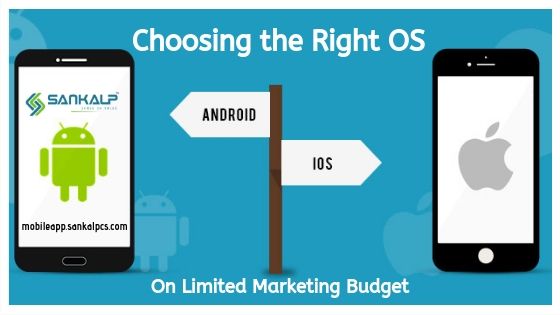With the advent of the digital era, there’s always new competition around the corner. But when it comes to OS, the two titans in mobile app development are undoubtedly iOS and Android. So, should you go for Android app development and choose a readily available framework? Or is an exclusive app based on iOS app development more suited to your taste? Either way, the first thing you probably have to consider is the limitations of your mobile app marketing budget. Android or iOS app development involves a debate between PC and Mac, and it is considered the ultimate debate of the tech industry. With a limited budget, many experts would suggest you go for Android. This is where you need to consider that making an app is not enough. Marketing is equally important. So, how does iOS compare to Android? Let’s consider which is more affordable of the two.
Marketing the App
Marketing the app begins the minute development is over. iTunes and Google Play store charge differently, depending on certain factors. Apps registering with Android’s play store require a one-time registration fee. For iOS, one has to pay a recurring registration and subscription. If you have an app short-lived in terms of popularity of usage, it makes sense to not renew registration. Developers need to focus on new concepts before long, in such cases and iOS app development may take precedence. Utility apps, on the other hand, have a long shelf life and Android’s app store is preferable in such a case. Most people in limited marketing budgets looking for one-time apps are logging onto Google, which recorded a 27% growth in app revenue the previous year.

Launch Cost on App Store
Mobile app development is not the last phase. It is only the initial stage and marks progressive growth. Post-launch, an app needs to be considered on relevant app stores. Apps may come and go, but few remain in their steady state and get longer success. So consider the cost of the app store launch and whether a one-time charge or recurring subscriptions suit your mobile marketing budget better.
Cost Per Install
Calculating cost per app installation for apps is easy. It’s like PPC marketing. An app owner can consider this as the metric for app marketing strategies. CPI or cost per app installation moves past the users viewing the advent of the app. Instead, the payment is deducted once the app is actually installed. Across well-developed markets like the US, CPI rates for iOS apps are higher than Android apps. The app store CPI rates vary across regions though. CPM, CPS, and CPE are other useful measures. Android always turns out to be cheaper, even when metrics like these are used.
Study Your User
While iOS users are revealed to be a smaller niche, they are also high-income users spending more time and resources on the app. Android users are from low-income countries. This is why many businesses prefer iOS apps. Diverse populations work better with Android apps, but if you want budget-friendly campaigns to bring in more revenue, that is hard. Instead, target high-income individuals and get the best value for your money by opting for an iOS enterprise app.
Cost of App Store Optimization
How much does the app store optimization cost? As Android is a Google-owned product, it makes sense for marketers looking to cash in on the sound SEO this leading search engine giant offers. Smart algorithms, however, ensure apps that are displayed on search engines are those relevant to the device’s OS. SEO and ASO are, therefore, worlds apart.
Push Notifications
Another point to consider while deciding your mobile marketing budget is the reaction to push notifications. While Apple iOS users have higher engagement rates and tend to be more active, Android users are twice as likely to click on push notifications. So factor this disparity into your budget, given that Android offers a quicker, better response when it comes to spending on push notifications.
Conclusion
Even market share metrics show Android has double the market share of Apple. While the revenue generated depends on the platform used for the app, Android is not necessarily the best choice here. Higher revenues are generated by iOS apps. Android apps earn income from ad displays. Testing, on the other hand, costs more for Android. So choose wisely and make an informed decision. Here to help you through the process is Sankalp’s exceptional mobile app development team across versatile and diverse industries and verticals.







Add comment